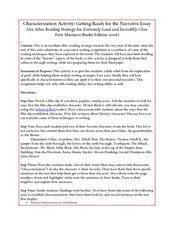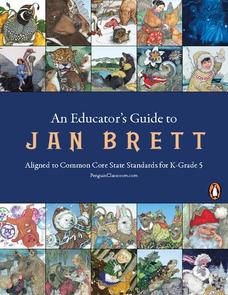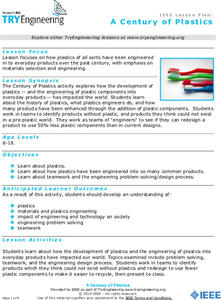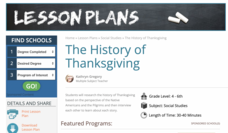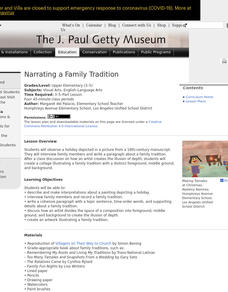Curated OER
Shizuko’s Daughter: Question Answer Relationships
Asking questions about what you're reading is an effective way to connect with the text. After kids read passages from Kyoko Mori's Shizuko's Daughter, they identify questions about the passages as Right There, Think and Search, On Your...
Curated OER
Extremely Loud and Incredibly Close: Characterization Activity
Oskar Schell's narrative about his expedition to find out more about his father serves as a model for writers who are crafting their own narratives. Class members choose two characters from the novel and collect examples of the methods...
Curated OER
Finders Keepers: Vocabulary Instructional Routine Guide for Extremely Loud and Incredibly Close
Like Oskar, the curious boy in Jonathan Safran Foer’s story, class members journey through other “stories that the mouth can’t tell” to find another sentence that uses a word found in novel. Individuals create their own vocabulary list,...
Curated OER
Learn-to-Read Pumpkin Patch
Learners practice identifying and pronouncing the short letter "u" sound. For this phonetic awareness lesson, students access the Starfall.com website and follow the directions on the screen to reinforce the short "u" sound. Learners can...
EngageNY
Author’s Read: Final Performance Task
Scholars submit their final performance task, a letter to a publisher about an athlete's legacy. As a culminating activity, they share their work with classmates in small groups.
Southern Nevada Regional Professional Development Program
Was Bias A Factor? Make an Argument
The ability to analyze an argument is a skill emphasized by the Common Core standards. Offer your class an opportunity to develop and hone their skills by providing them the testimonies in an Oregon court case. After reading the facts of...
Penguin Books
An Educator's Guide to Jan Brett
Prepare to teach Jan Brett stories by taking a look at this teacher resource, which includes text-based questions, writing assignments, discussion ideas, and vocabulary practice for 18 different stories.
K12 Reader
Waves and Currents
Waves, currents, crests, and troughs. Using information provided in an article about waves and currents, readers define terms used to describe how energy travels.
Scholastic
Pilgrim and Wampanoag Daily Life for Grades 6–8
Two slide shows, viewed side-by-side, permit middle schoolers to compare and contrast the lives of the Pilgrims of the Plimoth colony and the Wampanoags. Four videos take learners on virtual field trips to the Plymouth plantation. And an...
Institute of Electrical and Electronics Engineers
A Century of Plastics
After reading about polymer materials, engineer trainees examine how plastics have been integrated into everyday products. In groups, they compile a list of products made entirely without plastics and then, as a closing activity, try to...
Curated OER
Reading: Personality-Type Questionnaire
While this activity is a personality questionnaire, it could be used for a variety of purposes. High school learners might use this activity as a way to spur discussion about individual traits. The 20-question activity contains scenarios...
Constitutional Rights Foundation
Is Democracy in Decline?
Has democracy outlived its usefulness? Pundits debate the topic, and now pupils weigh in, too. A reading on how democracy may be on the decline around the world, along with a structured conversation guideline, help guide scholars through...
EngageNY
Selecting Evidence: “The Hero’s Journey” and The Lightning Thief (Chapter 6)
Take a closer look. Scholars learn how to read closely using chapter six in The Lightning Thief. While reading, they write the gist of paragraphs on sticky notes and stick them in the book. They then answer text-dependent questions over...
Teacher.org
The History of Thanksgiving
The first Thanksgiving is the focus of a lesson that boosts reading comprehension and interview skills. Half the class reads about Pilgrims while the other half reads about the Native American, Squanto. After answering questions, pupils...
K20 LEARN
Ichabod and Brom - Ghostfacers: Credibility and The Legend Of Sleepy Hollow
A headless horseman? Really? A reading of "The Legend of Sleepy Hollow" launches a study of how to use the A-CLAP strategy to determine a story's credibility. Writers employ these techniques to craft their ghost stories and make them...
National Endowment for the Arts
Teacher's Guide: The Great Gatsby by F. Scott Fitzgerald
A 10-lesson unit takes high schoolers through a novel study of F. Scott Fitzgerald's The Great Gatsby. To start, students learn about Fitzgerald's background and gain historical context that prepares them for a reading of the book. The...
North Carolina Consortium for Middle East Studies
Federalists v. Anti‐Federalists
Here is a solid lesson plan to support your instruction on the Continental Congress and the Articles of Confederation. It includes close analysis of primary source images, a guided notes template and answer key, and many key points to...
Stories on the Way
The Temptation of Jesus
Temptation is the focus of this lesson plan, which was designed for the first week of Lent as an introduction to the tradition of Lenten fast. It includes reading of biblical scripture, hands-on activities where learners design cards...
Maryland Department of Education
The Concept of Identity Lesson 2: The Historical/Biographical Approach
"How does our environment shape our identity?" After researching biographical information about John Knowles and considering how these experiences are reflected in A Separate Peace, class members consider the strengths and weaknesses of...
Maryland Department of Education
The Concept of Identity Lesson 7: Logical Fallacies
What are the effects of competition in an academic environment? The competition between the main characters in A Separate Peace motivates a series of activities that asks readers to take a stance on competition, and then to develop a...
College Board
2008 AP® English Literature and Composition Free-Response Questions Form B
Ever wondered what your dog is thinking? Scholars take a close look at two poems written through the eyes of animals and then create essays analyzing each author's technique. Pupils also read a passage to write about the literary...
PBS
Exploring the Drive to Create in Frankenstein
Is it hubris that drives the creative process? Is it the desire to be remembered long past death? An interactive asks readers of Mary Shelley's novel Frankenstein and Percy Shelley's poem "Ozymandias" to consider what this wife and...
J. Paul Getty Trust
Narrating a Family Tradition
After examining a piece of art, scholars discuss what they see, paying close attention to details and space. A read-aloud introduces the topic of family traditions. Pupils interview their family members about a tradition in preparation...
Scripps Ranch High School
The Crucible Journal Project
While reading Arthur Miller's The Crucible, start or end each day with a journal activity. The project includes a list of prompts for each act of the play. Pupils choose a prompt every time they write and connect their own experiences to...
Other popular searches
- Close Reading Passages
- Close Reading Activities
- Close Reading Exercises
- Close Reading Science
- Close Reading Drills
- Close Reading Tone
- Close Reading Camel
- Poem Close Reading
- Easter Close Reading
- Close Reading Passages Space
- Close Reading Ghost Towns
- Reading Close Procedure



